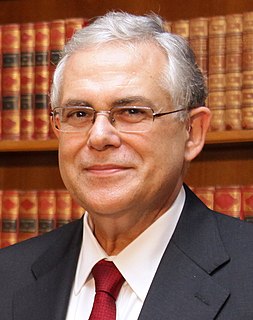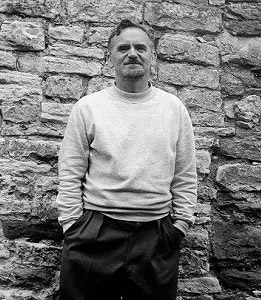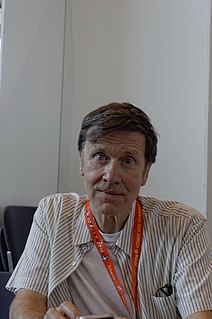Top 1200 Greek Philosophy Quotes & Sayings - Page 2
Explore popular Greek Philosophy quotes.
Last updated on December 19, 2024.
Rumors and reports of man's relation with animals are the world's oldest news stories, headlined in the stars of the zodiac, posted on the walls of prehistoric caves, inscribed in the languages of Egyptian myth, Greek philosophy, Hindu religion, Christian art, our own DNA. Belonging within the circle of mankind's intimate acquaintance ... constant albeit speechless companions, they supplied energies fit to be harnessed or roasted.
A writer must always try to have a philosophy and he should also have a psychology and a philology and many other things. Without a philosophy and a psychology and all these various other things he is not really worthy of being called a writer. I agree with Kant and Schopenhauer and Plato and Spinoza and that is quite enough to be called a philosophy. But then of course a philosophy is not the same thing as a style.
Philosophy is the science of estimating values. The superiority of any state or substance over another is determined by philosophy. By assigning a position of primary importance to what remains when all that is secondary has been removed, philosophy thus becomes the true index of priority or emphasis in the realm of speculative thought.
The adjective "political" in "political philosophy" designates not so much the subject matter as a manner of treatment; from this point of view, I say, "political philosophy" means primarily not the philosophic study of politics, but the political, or popular, treatment of philosophy, or the political introduction to philosophy the attempt to lead qualified citizens, or rather their qualified sons, from the political life to the philosophic life.
I suppose there is no place in the world where snobbery is quite so ever-present or where it is cultivated in such refined and subtle forms as in an English public school. Here at least one cannot say that English ‘education’ fails to do its job. You forget your Latin and Greek within a few months of leaving school — I studied Greek for eight or ten years, and now, at thirty-three, I cannot even repeat the Greek alphabet — but your snobbishness, unless you persistently root it out like the bindweed it is, sticks by you till your grave.
One of the things I want to do in the book is to explore how philosophy can be done in literature. I start doing that in the first chapter, by introducing the idea of "philosophy by showing". What literature/philosophy shows is how to look at some important facets of life in a new way, thus changing the frame in which subsequent philosophical argument proceeds.
..I sought a world philosophy-or an integral philosophy-that would believably weave together the many pluralistic contexts of science, morals, aesthetics, Eastern as well as Western philosophy, and the world's great wisdom traditions. Not on the level of details-that is finitely impossible; but on the level of orienting generalizations: a way to suggest that the world really is one, undivided, whole, and related to itself in every way: a holistic philosophy for a holistic Kosmos, a plausible Theory of Everything.
Philosophy aims at the logical clarification of thoughts. Philosophy is not a body of doctrine but an activity. A philosophical work consists essentially of elucidations. Philosophy does not result in 'philosophical propositions', but rather in the clarification of propositions. Without philosophy thoughts are, as it were, cloudy and indistinct: its task is to make them clear and to give them sharp boundaries.
We are usually told that democracy originated in ancient Athens - like science, or philosophy, it was a Greek invention. It's never entirely clear what this is supposed to mean. Are we supposed to believe that before the Athenians, it never really occurred to anyone, anywhere, to gather all the members of their community in order to make joint decisions in a way that gave everyone equal say?
When people ask me what philosophy is, I say philosophy is what you do when
you don't know what the right questions are yet. Once you get the questions
right, then you go answer them, and that's typically not philosophy, that's
one science or another. Anywhere in life where you find that people aren't
quite sure what the right questions to ask are, what they're doing, then,
is philosophy.
Philosophy appears to some people as a homogenous milieu: there thoughts are born and die, there systems are built, and there, in turn, they collapse. Others take Philosophy for a specific attitude which we can freely adopt at will. Still others see it as a determined segment of culture. In our view Philosophy does not exist.
BERTRAND RUSSELL, The Philosophy of Logical Atomism We've associated that word philosophy with academic study that in its own way has gotten so far beyond the layman that if you read contemporary philosophy you've no clue, because it's almost become math. And it's odd that if you don't do that and you call yourself a philosopher that you always get 'homespun' attached to it.
One can delineate the domain of philosophy however one likes, but in its search for truth, philosophy is always concerned with human existence. Authentic philosophizing refuses to remain at the stage of knowledge […]. Care for human existence and its truth makes philosophy a 'practical science' in the deepest sense, and it also leads philosophy—and this is the crucial point—into the concrete distress of human existence.
Experience has repeatedly confirmed that well-known maxim of Bacon's that 'a little philosophy inclineth a man's mind to atheism, but depth in philosophy bringeth men's minds about to religion.' At the same time, when Bacon penned that sage epigram... he forgot to add that the God to whom depth in philosophy brings back men's minds is far from being the same from whom a little philosophy estranges them.
Hellenic science is a victory of rationalism, which appears greater, not smaller, when one is made to realize that it had been won in spite of the irrational beliefs of the Greek people; all in all, it was a triumph of reason in the face of unreason. Some knowledge of Greek superstitions is needed not only for a proper appreciation of that triumph but also for the justification of occasional failures, such as the many Platonic aberrations.
Plotinus, when he thinks about mind or intellect, the Greek word is 'nous', he thinks about something that's very different, it's much more elevated and special, more abstract, you might say more philosophical than the very broad range of mental events that we talk about in contemporary philosophy of mind.
When I got to college, I planned to be a math major, and, in addition to signing up for some math courses, I decided to take some philosophy. Quite by chance, I took a philosophy of science course in which the entire semester was devoted to reading Locke's Essay. I was hooked. For the next few semesters, I took nothing but philosophy and math courses, and it wasn't long before I realised that it was the philosophy that really moved me.
I did have the resource of having taught Greek mythology and the history of Western civilization, and you can go back into the plays of Aeschylus and follow what happens when people seek revenge, and there are people plucking their eyes out. And Greek mythology is filled with all kinds of monsters and whatnot.
Some of my understanding of what philosophy and ethics is has changed very slowly. One thing that has changed is this for quite a long time I bought-into the idea that philosophy is basically about arguments. I'm increasingly of the view that it isn't. The most interesting things in philosophy aren't arguments. The thing that I think is underestimated is what I call a form of attending. I think that philosophy is at least as much about carefully attending to things as it is about the structure of arguments.
There is a truth in Schopenhauer’s view that philosophy is an organism, and that a book on philosophy, with a beginning and end, is a sort of contradiction. ... In philosophy matters are not simple enough for us to say ‘Let’s get a rough idea’, for we do not know the country except by knowing the connections between the roads.
Albanians love topiary and fancy doors. They speak Albanian, an Indo-European language with traces of Greek and Latin - and the lek is their monetary denomination, which trades at one hundred to one on the dollar. Their food is excellent, a melange of Greek, Turkish, and Italian cuisine, all very fresh and legume-y.
Versatility is one of the few human traits which are universally intolerable. You may be good at Greek and good at painting and be popular. You may be good at Greek and good at sport, and be wildly popular. But try all three and you’re a mountebank. Nothing arouses suspicion quicker than genuine, all-round proficiency.
Consciously or unconsciously, most theists see in gods and devils, heaven and hell, reward and punishment, a whip to lash the people into obedience, meekness and contentment.... The philosophy of atheism expresses the expansion and growth of the human mind. The philosophy of theism, if we can call it a philosophy, is static and fixed.
I think Eros should be dirty. In Greek legend, as I'm sure you are aware, he fell in love with the minor deity Psyche. It was the Greek way of saying that, in spite of what it may believe, Love pursues the Soul, not the body; the Erotic desires the Psychic. If Love was clean and wholesome he wouldn't lust after Psyche.




















































